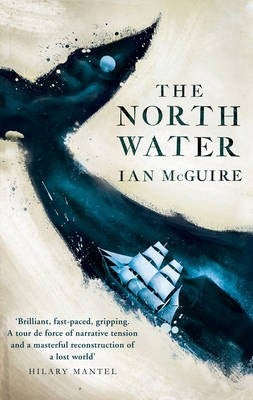Ian McGuire, The North Water: 'Subtle as a harpoon in the head, but totally gripping', book review
Ian McGuire’s second novel resembles a particularly gruesome Grand Guignol, stuffed to the gills with scenes of death, violence and depravity

Sailors skin a polar bear, filling the air with “a foetid blast of butchery and excrement”. A sea captain shoots a mutineer in the head, splattering “an aureole of purplish brain matter” on the wall. A surgeon operates on a patient’s abscessed stomach, releasing a cataract of “foul and flocculent pus”.
A whaler throws his harpoon and is “drenched in the fish’s steaming, expectorated gore”.
The North Water is not what you’d call a subtle book. The story of a doomed 19th-century whaling voyage, Ian McGuire’s second novel resembles a particularly gruesome Grand Guignol, stuffed to the gills with scenes of death, violence and depravity.
When McGuire’s sailors are not killing wild beasts they are killing each other – and worse. Compared with this savage tale of Arctic survival, Leonardo DiCaprio’s bear-wrestling ordeal in The Revenant looks like something out of A A Milne.
The year is 1859. Henry Drax is on shore leave in Hull, waiting for the departure of his ship, the Volunteer, which is bound for the icy waters between Greenland and Canada to harvest whale blubber.
A monstrous, alcoholic harpooner, Drax’s enthusiasm for clubbing baby seals is the least of his perversions.
Before the first chapter is over, he has brained a stranger to death with a house-brick (“there is a fine spray of blood and a noise like a wet stick snapping”) and raped and murdered a homeless boy.
Among Drax’s unfortunate shipmates on the Volunteer is the Irish medic Patrick Sumner, formerly a surgeon in the British army.
A gentle, bookish man, Sumner is recovering from his experiences in Delhi during the Indian Rebellion of 1857, where – as we learn in a humid and breathless flashback – he took a bullet in the leg and became addicted to opiates.
The 15 best opening lines in literature
Show all 15Sumner plans to spend the months at sea reading Homer, painting watercolours, and dosing himself with enough laudanum to subdue a walrus.
No such luck. After the ship launches, Sumner discovers that one of the cabin boys has been sexually assaulted; the child is later murdered. The culprit is Drax, and he is locked up belowdecks.But shortly afterwards the Volunteer is dashed on the ice floes and is sunk, thanks to the connivance of the dull-witted first mate, who is after the insurance money. Sumner and the crew must battle to survive on the Arctic ice, menaced by blizzards, ravenous polar bears – and Drax himself, who has slipped his chains and escaped into the tundra.
McGuire expertly arranges all this mayhem, and the narrative is horrifically gripping. Or perhaps that should be, grippingly horrific. Some readers may deem the gothic-sensationalist elements overdone – I’m not sure we really need to know that rotting whale blubber resembles the “unspeakable rectal oozings of a human corpse”– but McGuire’s focus on the visceral details of whaling certainly lends the book a fishy whiff of authenticity.
The North Water is smoothly readable despite the horrors it depicts, and that’s testament to the quality of McGuire’s prose. The effect can be timber-shiveringly creepy, as when we learn that Sumner carries among his surgical implements a “newish bone saw”. (Somehow, neither “bone” nor “saw” is the most chilling word in that phrase.)
And there are sublime descriptions of Arctic landscapes, proffered as if by way of apology for all the blood and guts. McGuire gives us an iceberg, “immense, chimneyed, wind-gouged, sliding eastwards like an albinistic butte unmoored from the desert floor”, and “great right whales lying bunched in pods like leaden storm clouds beneath the silent sheets of ice”.
Such fine writing might have been lifted from the pages of Herman Melville’s Moby-Dick. And indeed, one way of looking at The North Water is as an extended homage to the great maritime novels of the past.
McGuire – formerly a lecturer in American Literature at the University of Manchester, where he now teaches creative writing – pays tribute to Melville with a series of covert allusions to his work. We learn that Drax previously travelled to the Marquesas islands aboard the Dolly, which was the fictional vessel in Melville’s first novel, Typee.
Tonally, The North Water evokes the darker maritime fiction of Edgar Allan Poe and Jack London, in which the savagery of nature is measured and found wanting next to the savagery of human beings.
London’s The Sea Wolf seems a particular influence here, especially its central character, a formidable sea captain named Wolf Larsen, whom London intended as a satire on Nietzsche’s concept of the Übermensch. Larsen fancies himself to be beyond good and evil, and indulges his dubious appetites without compunction.
There’s much of Larsen in the wolfish Drax, who re-emerges for a showdown with Sumner during The North Water’s thrillerish final stages. Needless to say, victory in this merciless novel is not cleanly won. As the good doctor discovers, gaze long into the abyss, and the abyss gazes into you.
The North Water, by Ian McGuire. Scribner £14.99
Subscribe to Independent Premium to bookmark this article
Want to bookmark your favourite articles and stories to read or reference later? Start your Independent Premium subscription today.

Join our commenting forum
Join thought-provoking conversations, follow other Independent readers and see their replies